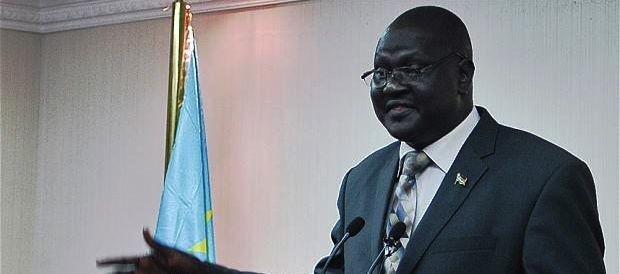The spokesman in South Sudan’s Office of the President on Tuesday failed to present evidence to support his claim that three bills relating to the media were signed into law by the president, and if so, which versions of the bills were signed.
The three bills aim to create a ‘Media Authority’ to regulate media, lay out procedures for how journalists can access public records and other information, and establish the Public Broadcasting Corporation.
Ateny Wek Ateny, press secretary in the Office of President, announced today that President Salva Kiir Mayardit signed the three media bills into law, but declined to provide copies of the purported new laws to the press.
He said that his office was still in discussions with the Ministry of Information and Ministry of Justice in order to release copies of the new laws through the Union of Journalists and the Association for Media Development in South Sudan (AMDISS).
Ateny said copies of the text of the bills would not be provided until next week.
There were also conflicting reports on whether the bills were physically signed yesterday or today, if at all. One media representative who spoke to Ateny Wek yesterday was told that the bills were already signed, but another journalist was told by the same official that only the Broadcasting Corporation Bill was signed.
Another source suggested yesterday that the actual signing by the president would not come until after Ateny Wek’s press conference today.
The bills are reported to have gone missing at some point during the legislative process, possibly between the time of passage by parliament and their reported signature by the president today.
Media representatives today were skeptical as to the content of the laws supposedly signed into law by the president.
Alfred Taban, an executive member of the Association for Media Development in South Sudan, said he was not fully convinced that the laws that had been signed were exactly what they sent to the parliament.
“We are a bit worried that in this length of time some provisions have been expelled out, and we are a bit skeptical until we see it and make sure that these are exactly the laws that we had worked on,” he said.
He also expressed concern over the modalities for establishing the Media Authority, which would regulate the media, adding, however, “If we see that people who are in this authority are good one and credible, we will welcome them.”
The text of the bill reportedly states that the president in consultation with the Ministry of Information will be the one to appoint the media council.
Alfred Taban urged the media houses and journalists to wait until they see the exact copy of the signed media laws before reaching judgment on the matter.
‘Nationalist’ media
The announcement of the bill signing comes amid an ongoing government push to make the media more “nationalistic,” nearly a month after the closure of the Catholic Church’s radio station in the South Sudanese capital.
On Friday the president appointed a security official to head the state television and radio, which since December has reported extensively on military mobilization and recruitment campaigns and on the failed coup d’etat that the government announced in December.
On Sunday, Michael Makuei Lueth, Minister of Information and Broadcasting, addressed a gathering of journalists saying, “The fact that you are a journalist doesn’t mean that you are de-nationalized. It means that first you are a nationalist.”
“In the first place you are South Sudanese and if you are South Sudanese you are under responsibility as a South Sudanese – it is your duty to make sure that – to protect the interests of your nation, to protect the interests of your country, and to protect the security of your country.”
“Whenever you are writing or whenever you are talking in any FM radio, or in any media, please put your country first. You must be seen to be nationalists. Otherwise, these freedoms if we continue to use these freedoms in this way, then this is the time when you find yourself automatically in conflict with the law.”
Makuei lashed out at media who criticize the government ‘destructively. “We welcome criticism, but what type of criticism? Most of you who are writers now, what you do is a destructive criticism. And this is not acceptable.”
“You cannot go on writing… agitating the people against their government. And then you say this is ‘freedom of expression’. No, this is a destructive criticism. Criticize objectively, criticize constructively – this is what we want.”
He also reiterated a ban on interviewing ‘rebels’, saying, “If you can go and interview a rebel… you are actually disseminating material of the enemy.”




